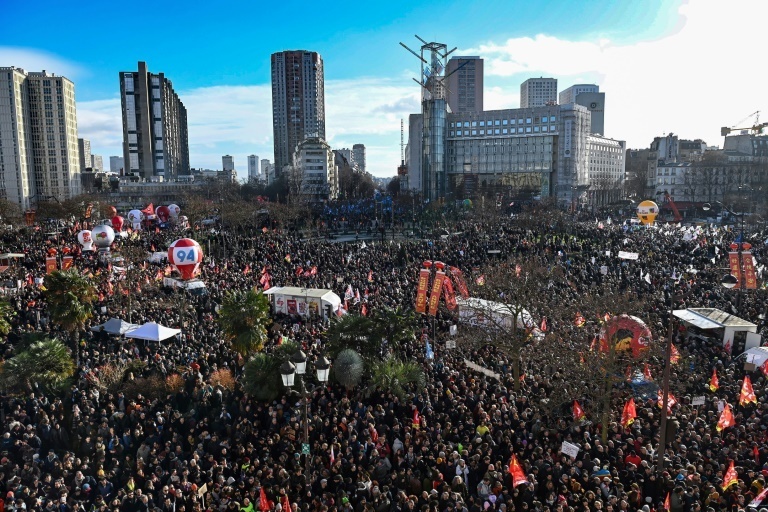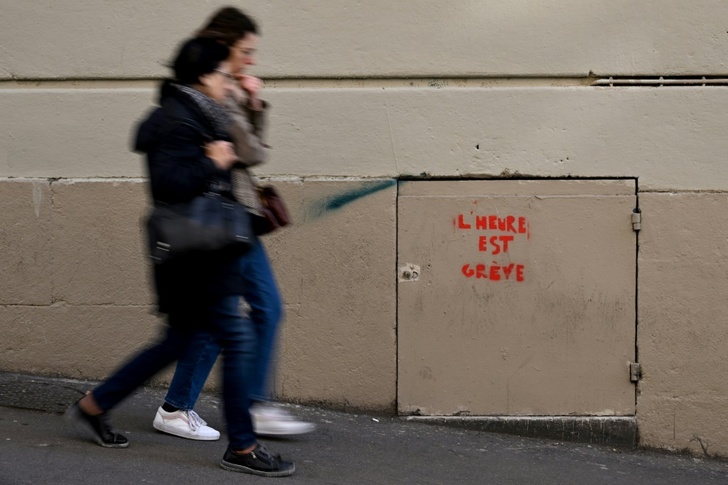France's trade unions were headed for a crucial face-off with President Emmanuel Macron on Tuesday, with fresh strikes and protests planned against a controversial pensions reform he has championed.
Unions have vowed to bring the country to a standstill over the proposed changes, which include raising the retirement age from 62 to 64 and increasing the number of years workers have to make contributions for a full pension.
"I call on all the country's employees, citizens and retirees who are against the pensions reform to come out and protest en masse," the head of the CFDT union Laurent Berger told the France Inter radio station on Monday.
"The president cannot remain deaf" to the protests, he added.
"There is today a huge social movement... and it will need a political response."
The president put the plan at the centre of his re-election campaign last year, and his cabinet says the changes are essential to prevent the pensions system from falling into deficit in coming years.
But they face fierce resistance from both parliament and the street, with almost two in three people across the country supporting protests against it, according to a poll by the Elabe survey group published Monday.
- More than a million expected -
From Tuesday, unions have warned of rolling strikes on public transport that could paralyse parts of the country for weeks on end.

The upper limit of that range would mean stronger opposition nationwide than during the five previous days of rallies since mid-January.
In the biggest day of demonstrations so far, 1.27 million people demonstrated on January 31, according to official figures.
The most recent rallies last month drew smaller crowds, but unions have been betting on renewed energy on Tuesday as all of France has returned from weeks of school holidays.
Unions have promised to bring the country "to a standstill".
Only one in five regional and high-speed trains are expected to run, while a leading trade unionist representing refinery workers has vowed to bring the French economy "to its knees".
School teachers are also to stage walkouts.
Prime Minister Elisabeth Borne on Monday evening said she respected people's right to protest.
But union leaders calling for people to bring the economy to its knees was "not responsible" as it would primarily penalise "the most fragile" among the population, she said in a televised interview on France 5.
- 'Need to work longer' -
The government has argued that the changes are crucial to lift France's pensions system out of deficit by 2030.
The proposals would bring France closer into line with its European neighbours, most of which have retirement ages of 65 or higher.

"If we want to keep this system going, we need to work longer," he said.
But unions argue that the proposed measures are unfair, and would disproportionately affect low-skilled workers in tiring jobs who start their careers early.
According to the Elabe survey, 56 percent of respondents said they supported rolling strikes.
Fifty-nine percent said they backed the call to bring the country to a standstill.
The bill is now being debated in the upper house of parliament, after two weeks of heated debate in the lower house that ended without even reaching a vote on the contentious article on raising the retirement age.
The centrist government is hoping to push through the reform in parliament with help from the right, without resorting to a controversial mechanism that would bypass a parliamentary vote but risk fuelling more protests.
burs-ah/sjw/pvh/smw
© Agence France-Presse
Your content is great. However, if any of the content contained herein violates any rights of yours, including those of copyright, please contact us immediately by e-mail at media[@]kissrpr.com.
Source: Story.KISSPR.com

